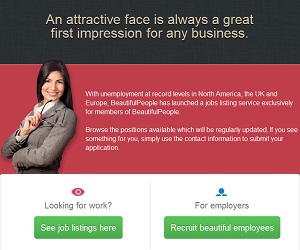
A controversial online dating website that only allows beautiful members has expanded into the recruitment sphere.
 The controversial online dating website whose exclusively attractive membership decides whether other members are beautiful enough to remain, BeautifulPeople.com, expanded its services on Monday. The website now offers a free recruitment feature for employers seeking attractive staff, and attractive people wanting jobs.
The controversial online dating website whose exclusively attractive membership decides whether other members are beautiful enough to remain, BeautifulPeople.com, expanded its services on Monday. The website now offers a free recruitment feature for employers seeking attractive staff, and attractive people wanting jobs.
Managing director Greg Hodge said in a statement that most of his members were in lucrative professions. “But for those who aren’t giving them access to potential employers is an added benefit to their membership, especially in these economic tough times,” Hodge added.
Individuals and companies looking to hire have a dedicated business profile and access to 750,000 beautiful people. They are able to pursue members who indicate they are looking for a job, while members have the opportunity to browse job listings and apply directly to companies.
“An honest employer will tell you that it pays to hire good-looking staff,” Hodge said. “Attractive people tend to make a better first impression on clients, win more business and earn more.”
Hodge insisted that he wanted the service to be taken seriously, not used as an excuse to ogle beautiful men and women. He said the site’s staff validated each business to ensure that the job opportunities posted were ‘safe and legitimate.’
Employment lawyer Blair Scotland, principal with Dundas Street, said that it is not unlawful to refuse to hire someone on the basis of their physical appearance. “There’s 13 prohibited grounds under the Human Rights Act, and appearance isn’t one of them – so on that basis it’s not a prohibited grounds of unlawful discrimination,” he said.
However, if, for an employer, physical attractiveness intersects with one of these prohibited grounds, they could get into trouble. “Where you get into danger…is where you start doing things like equating attractiveness with things like age, for example,” Scotland explained.
There are historical US cases involving airlines who only wanted to hire attractive flight attendants, Scotland observed. “On the face of it, that could be okay, but the problem is they were, if not directly but certainly indirectly, discriminating against, in particular, women over a certain age.”
However, Scotland thought it was unlikely that a New Zealand employer would encounter legal issues using such a website, which is essentially a closed database. Although he wasn’t convinced that it would be popular: “I’m not sure it will take off in New Zealand, but you never know, you never know.”